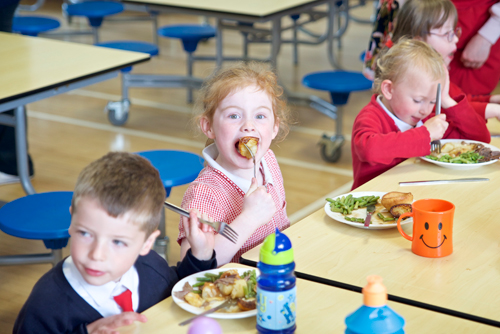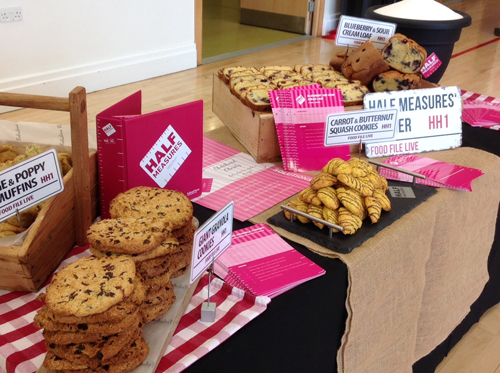Public sector focus: Winning the war on sugar
Katey Pigden investigates
There is an obesity crisis in full swing in the UK and childhood obesity is becoming a major problem in itself. The issue is hitting the headlines all too frequently and the country is in the midst of a war on sugar with the likes of Jamie Oliver leading the fight.
But what can caterers do to help combat this crisis? Are they ready to step up to the challenge and tackle the problem head on? Research shows that obese children are more likely to become obese adults, with a higher risk of developing type 2 diabetes and heart disease. This, in turn, will put a greater strain on an already suffering NHS.
Something clearly needs to be done to educate children but, perhaps more importantly, also the adults who are responsible for these children. And where better to start than at school?
Myles Bremner, director of the School Food Plan, says: "Schools need to lead the way in tackling obesity and there are many schools doing amazing things; not just reducing sugar content in their meals, but by taking a whole-school approach to food provision and food education.
"By working together, caterers, head teachers, teachers, pupils, parents and governors can all support a culture and ethos of healthy eating. They will meet the Ofsted criteria, but more importantly they will be giving children the foundations for a healthy and happy life."
The Lead Association for Catering in Education (LACA) echoes this view and argues that if parents are worried about their child's sugar intake, then a good starting point would be to make sure they are signed up for school meals.
"There is nothing more transparent than a school meal. Parents can be reassured and safe in the knowledge that school meals won't be overloaded with sugar, salt and fat," says Carrieanne Bishop, the immediate past chair of LACA.
"Things have changed over the years in regards to regulations for school menus and there has already been a significant reduction in all three of these ingredients.
"Children's health is of paramount importance and sugar is less of an issue with school meals as schools operate with food-based standards. Recipes have been amended, so even something such as a sticky toffee pudding will have been adapted to have less sugar.
"Children who have school meals are provided with a balanced meal without losing flavour. Changes can be made to recipes without children even noticing. It's the safest meal they can have. No food is bad food; it's all about balance. We view it as health by stealth."
Half Measures
And if an initiative christened 'Half Measures', created by independent education caterer Holroyd Howe is anything to go by, sometimes you can make sure the changes are undetected by not only children, but adults too.
The caterer's client, More House School in Surrey, managed to reduce the amount of sugar in its desserts by half without the slightest stirring from anyone. The programme was first introduced in late 2014 and the reduction equated to cutting school sugar consumption by 18kg-20kg a week - almost three-quarters of a tonne over a 34-week school year.
Since then, the scheme has been rolled out across all of Holroyd Howe's schools with great success, and this initiative, along with a few others, contributed to the company walking away with the title of Education Caterer of the Year at the 2015 Foodservice Cateys.
Holroyd Howe serves school meals to thousands of children aged three to 18 every day, and the company says it is "duty-bound to ensure their pupils are offered the right foods at every meal".
Ronan Harte, managing director at Holroyd Howe, says: "A typical independent school pupil is balancing an extremely busy schedule that combines academic lessons, the demands of the sports field and evening activities or prep. Each meal provided at school is setting them up for the next few hours, and it is the job of the caterers to make sure the balance of fats, proteins and carbohydrates is going to give them the optimum amount of energy to perform. One thing everyone can be sure of, however, is that they don't need any added sugar to achieve their best."
He adds: "By the time you reach your early twenties, your body is fully formed and that finished result is totally dependent on the nutritional building blocks you constructed it from. It is critical that schools get those building blocks right from a very early age."
Holroyd Howe's reduction of sugar in desserts sparked a much-needed conversation around sugar within schools generally, and led to further initiatives such as diluting fruit juice. This change resulted in a further reduction of sugar intake, as well as a reduction of carbohydrate levels to 7%.
Harte concludes: "Schools, through an inclusive initiative, can now play a proactive role in educating not only the children in their care but also their guardians, on not just the value of nutrition, but how they can identify health concerns in the family-eating format."
Meanwhile, multi-service facilities management firm Vertas, which provides catering for several schools in Suffolk, Norfolk and Essex, has also taken measures to reduce children's sugar consumption.
Ian Surtees, group managing director at Vertas says: "Vertas' primary school lunches are designed to provide a balanced and filling meal for our young people. Delicious homemade wholegrain bread with no additives - just flour, yeast and water - is freely available with main courses so that children are less hungry when they come to eat the second course.
"Desserts often include fruit to provide natural sweetness and have been sugar-reduced. Our schools offer fruit, yogurt and cheese as alternatives to sugary desserts as well as extra fresh fruit and salads."
He adds: "Vertas' school cooks are always on-hand to advise parents and school staff about healthier eating and the menu design."
Another school caterer, Eden Foodservice, which won the Best Use of Technology Catey in 2015, is also proud of the changes it has introduced. The firm was the first contract caterer to achieve the Silver Food for Life Catering Mark across all its primary school sites.
Managing director Paul Salisbury says: "Eden has a clear focus on the health and wellbeing of children and young people. We've recently reviewed and significantly adjusted the sugar content in our desserts and cut sugar content by up to 40%, while still delivering on great taste and high-quality products for pupils."
The firm has also ensured that all drinks are compliant with the School Food Plan's Standards Healthy Drinks List, which imposes a restriction on portion sizes for fruit juice.
It also has a range of educational initiatives for pupils, including the 'Smoothie Bike', where pupils select their fruits and vegetables and make their own smoothies through pedal power.
To tax or not to tax?
TV chef Jamie Oliver is already well-known for his crusade for better school meals and now he has waged war against sugary drinks for children. Last year, a one-hour documentary entitled Jamie's Sugar Rush aired on Channel 4.
It explained why childhood obesity rates have risen dramatically within a generation and demonstrated how a "soda tax" in Mexico has helped to slow down the number of incidences of diabetes. In the UK we now have 700 amputations per year from diabetes alone.
In November last year, MPs debated introducing a tax on sugary drinks in the UK to improve children's health following a petition set up by Oliver, which attracted more than 150,000 signatures. The Government responded by saying it has no plans to introduce a tax on sugar-sweetened beverages.
A tax on sugary drinks would need to be set at 50% in order to deter consumers, according to Professor David Haslam, chairman of the National Obesity Forum. He told The Independent that the 20% levy recommended by Public Health England would be "insufficient", as anything less than 50% on sugary drinks would fail to act as a disincentive to consumers.
He says: "We don't currently support taxing food products… but sugary drinks have no place in anyone's diet."
School meals in keeping with the School Food Plan
Prime Minister David Cameron, who ruled out the prospect of a sugar tax as recently as October last year, may now be giving the matter a bit more thought. At a recent press conference, he told journalists: "I don't really want to put new taxes onto anything.
"But we do have to recognise that we face potentially in Britain something of an obesity crisis. When we look at the effect of obesity on not just diabetes but the effect on heart disease, potentially on cancer; we look at the costs on the NHS, the life-shortening potential of these problems. We do need to have a fully-worked up programme to deal with this problem and address these issues in Britain."
Whether or not a tax on sugar is introduced, it seems school caterers are already applying valuable initiatives and some simple, common sense solutions to reducing children's sugar intake, once again highlighting the value of decent school meals.
'Sugar Smart' Change4Life campaign
Public Health England has launched a new app to help parents get 'Sugar Smart' and take control of their children's sugar intake.
The Change4Life campaign follows revelations that four- to 10-year-olds consume around 22kg of sugar a year - the average weight of a five year old.
Dr Alison Tedstone, chief nutritionist for Public Health England, says: "Children are having too much sugar - three times the maximum recommended amount.
"This can lead to painful tooth decay, weight gain and obesity, which can also affect children's wellbeing, as they are more likely to be bullied, have low self-esteem and miss school."
The app helps parents see how much sugar there is in everyday food and drink.
The maximum daily amounts of added sugar
- Four- to six-year-olds Five cubes or 19g
- Seven- to 10-year-olds Six cubes or 24g
- 11+ Seven cubes or 30g
Childhood obesity
The World Health Organisation (WHO) regards childhood obesity as one of the most serious global public health challenges of the 21st century.
The National Child Measurement Programme measures the height and weight of around one million schoolchildren in England every year. The latest figures for 2014/15 showed 19.1% of children in Year 6 (aged 10-11) were obese and a further 14.2% were overweight.
For younger primary school children in reception classes (aged four to five) the figures showed that 9.1% were obese and a further 12.8% were overweight.
Earlier this month, the Liverpool Echo reported that 24 children under the age of three were treated for obesity at Alder Hey hospital in 2015. Just five years ago, only one child was treated for the condition at the hospital.
Tam Fry of the National Obesity Forum believes everyone has a role to play in helping children get into good habits to set them up for life.
He says: "There is no silver bullet solution; we need a broad range of actions to reverse the tide of child obesity."
The statistics came just days after Public Health England warned that the average five-year-old consumes the equivalent of their body weight in sugar within one year.
The government is expected to deliver its obesity strategy in the coming months.
Continue reading
You need to be a premium member to view this. Subscribe from just 99p per week.
Already subscribed? Log In











